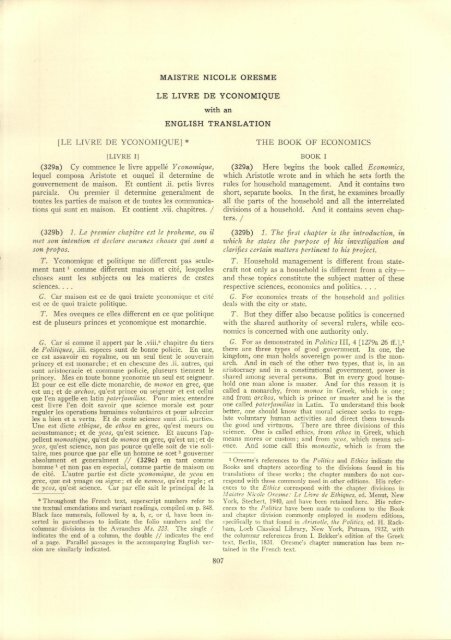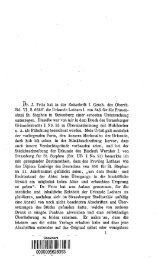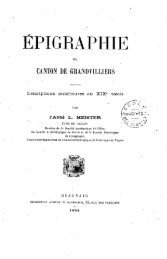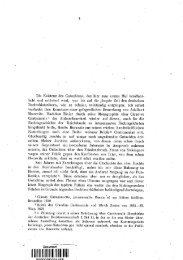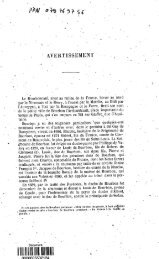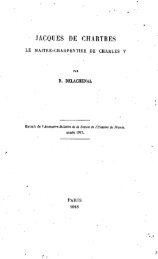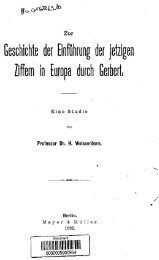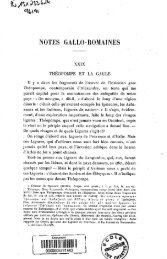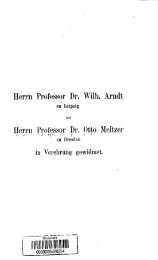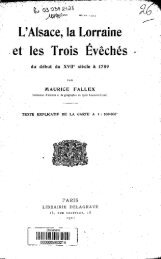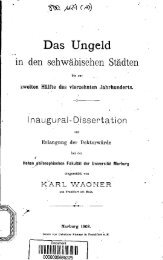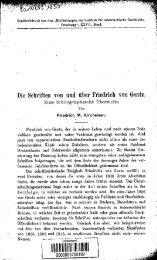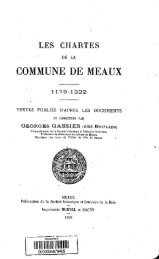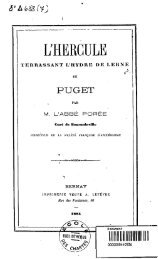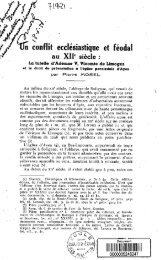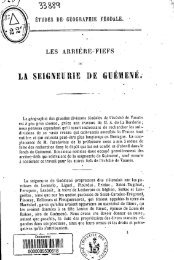4P Li gç(' TRANSACTIONS
4P Li gç(' TRANSACTIONS
4P Li gç(' TRANSACTIONS
Create successful ePaper yourself
Turn your PDF publications into a flip-book with our unique Google optimized e-Paper software.
MAISTRE NICOLE ORESME<br />
LE LIVRE DE YCONOMIQUE<br />
with an<br />
ENGLISH TRANSLATION<br />
ILE LJ\RE DE YCONOMIQUEI * THE BOOK OF ECONOMICS<br />
LIVRE I]<br />
(329a) Cy commence le livre appellé Yconomique,<br />
lequel composa Aristote et ouquel it determine de<br />
gouvernement de maison. Et contient ii. petis livres<br />
parcialz. On premier it determine generalment de<br />
toutes les parties de maison et de toutes les communications<br />
qul stint en maison. Et contient .vii. chapitres. /<br />
(329b) 1. Le f'renhier cha/'itre est le proheme, on ii<br />
met son intention et declare a neon-es choses qui sun-i a<br />
son pro pos.<br />
T. Yconomique et politique ne different pas seulement<br />
tant 1 comme different maison et cite, lesqueles<br />
clioses sunt les subjects ou les matieres de cestes<br />
sciences.<br />
G. Car maison est cc de quoi traicte yconomique et cite<br />
est cc de quol traicte politique.<br />
T. Mes ovequcs cc elles different en cc qtie politique<br />
est de pluseurs princes et yconomique est monarchic.<br />
G. Car si comme it apl)ert par Ic Viii.e chapitre du tiers<br />
de Poliliques, .iii. especes sunt de bonne policie. En one,<br />
ce est assavoir en royalme, ou un seul tient le souverain<br />
princey et est nionarche; et en chescune des .ii. autres, qui<br />
stint aristocracie et commune polici, pluseurs tiennent Ic<br />
princey. Ales en toute bonne yconomie un seul est seigneur.<br />
Et pour cc est cite dicte monarchic, de monos en grec, que<br />
est un; et de arciws, qu'est prince onseigneur et est cdliii<br />
qu l'en appelle en latin paterfamilias- Pour miex entendre<br />
cest livre len doit savoir ciue science morale est pour<br />
reguler les operations humaines voluntaires et pour adrecier<br />
les a bien et a vertu. Et de ceste science sunt .iii. parties.<br />
Une est dicte ethique, dc ethos en grec, qu'est incurs ou<br />
acoustumance; et (Ic ycos, quest science. Et aucuns l'appellent<br />
mottosfique, qu'est de monos en grec, qu'est on; et de<br />
yeas, qu'est science, non pas pource quelle soit dc vie solitaire,<br />
mes pource que par elle on homme se scet 2 gonverner<br />
absolument et generalnient // (3290 en tant comme<br />
hotnine 1 et non pas en especial, coinme partie de maison ou<br />
de cite. L'autre partie est dicte yconomique, de ycon en<br />
grec, que est ymage ou signe; et de nomos, qu'est regle; et<br />
de yeas, quest science. Car par dIe sait le principal dc la<br />
* Throughout the French text, superscript numbers refer to<br />
tOe textual emendations and variant readings, compiled oil 848.<br />
Black face numerals, followed by a, b, c, or d, have been inserted<br />
in parentheses to indicate the folio numbers and the<br />
columnar divisions in the Avranches Ms. 223. The single I<br />
indicates the end of a column, the double 1/ indicates the end<br />
of a page. Parallel passages in the accompanying English version<br />
are similarly indicated.<br />
807<br />
BOOK I<br />
(329a) Here begins the book called Economics,<br />
which Aristotle wrote and in which he sets forth the<br />
rules for household management. And it contains two<br />
short, separate books. In the first, he examines broadly<br />
all the parts of the household and all the interrelated<br />
divisions of a household. And it contains seven chapters.<br />
/<br />
(329b) 1. The first chapter is the introduction, in<br />
which he states the purpose of his -investigation and<br />
clarifies certain matters pertinent to his project.<br />
T. Household management is different from statecraft<br />
not only as a household is different from a city—<br />
and these topics constitute the subject matter of these<br />
respective sciences, economics and politics.<br />
G. For economics treats of the household and politics<br />
deals with the city or state.<br />
T. But they differ also because politics is concerned<br />
with the shared authority of several rulers, while economics<br />
is concerned with one authority only.<br />
G. For as demonstrated in Politics 111. 4 [1279a 26 ff.],i<br />
there are three types of good government. In one, the<br />
kingdom, one man holds sovereign power and is the monarch.<br />
And in each of the other two types, that is, in an<br />
aristocracy and in a constitutional government, power is<br />
shared among several persons. But in every good household<br />
one man alone is master. And for this reason it is<br />
called a monarchy, from nio;ros in Greek, which is one;<br />
and from archos, which is prince or master and he is the<br />
one called paterfamilias iii Latin. To understand this book<br />
better, one should know that moral science seeks to regulate<br />
voluntary human activities and direct them towards<br />
the good and virtuous. There are three divisions of this<br />
science. One is called ethics, from ethos in Greek, which<br />
means mores or custom; and from vcos, which means science.<br />
And some call this monastic, which is from the<br />
1 Oresnies references to the Politics and Ft/ne: indicate the<br />
Books and chapters according to the divisions found in his<br />
translations of these works; the chapter numbers do not correspond<br />
with those commonly used in other editions. His references<br />
to the Ethics correspond with the chapter divisions in<br />
.tlaisfre Nicole Ores-me: Le <strong>Li</strong>vre de Ethziqucs, ed. Menut, New<br />
York, Stechert. 1940, and have been retained here. His references<br />
to the Politics have been made to conform to the Book<br />
and chapter division commonly employed in modern editions,<br />
specifically to that found in An sf of/c. the Politics, ed. H. Rackham,<br />
Loch Classical <strong>Li</strong>brary, New York, Putnam, 1932, with<br />
the columnar references from I. Bekker's edition of the Greek<br />
text, Berlin, 1831. Oresme's chapter numeration has been retained<br />
in the French text.


